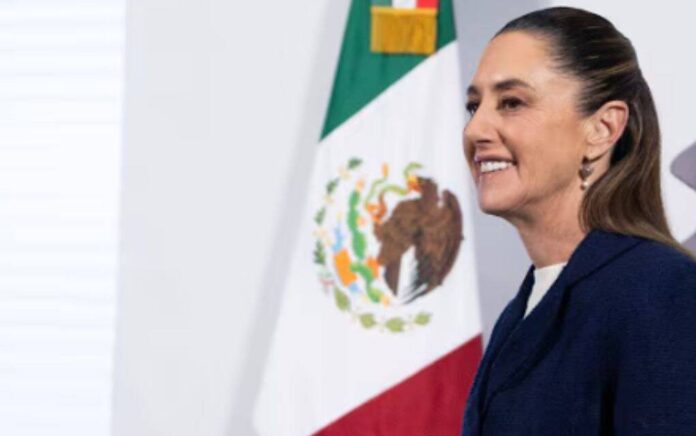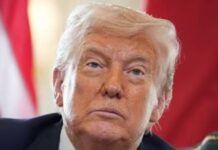
The Trump administration has been trying to reach deals with Mexico. But they aren’t budging.
And now the White House was stunned by what the Mexican President has just said about President Trump.
Mexican President Claudia Sheinbaum has firmly rejected any possibility of U.S. military intervention in Mexico, responding to reports that the Trump administration is planning to deploy military forces against Latin American drug cartels operating within Mexico’s borders.
“The United States is not going to come to Mexico with the military,” Sheinbaum declared during her daily press briefing on August 8. “We co-operate, we collaborate, but there is not going to be an invasion. That is ruled out, absolutely ruled out.”
Sheinbaum’s remarks were prompted by an August 8 New York Times article reporting that President Donald Trump had issued a confidential directive authorizing the U.S. military to target transnational fentanyl traffickers based in Mexico.
According to the report, Trump’s directive focuses on combating cartels, following the U.S. decision in February to classify the Sinaloa Cartel and other Mexican drug organizations as global terrorist entities. Some experts suggest this designation could pave the way for military operations on foreign soil.
A U.S. official, speaking anonymously to Reuters, confirmed the directive’s existence but noted that military action against these groups does not seem imminent, and the specifics of potential operations remain unclear. Trump has repeatedly stated that the U.S. would act unilaterally with military force if Mexico does not dismantle its drug cartels. This stance has strained relations with Mexico, a vital trade partner. In response, Sheinbaum has urged Trump to address the flow of American-made high-powered weapons into Mexico, which fuels cartel violence.
The leaders have engaged in multiple discussions this year, covering security, trade, and immigration issues. Sheinbaum previously addressed similar concerns following a May 2 Wall Street Journal report, which claimed Trump was pushing for greater U.S. military involvement in anti-cartel efforts on both sides of the border.
“In one of the calls, (Trump) said, ‘How can we help you fight drug trafficking? I propose that the U.S. Army come in to help you,’ ” Sheinbaum recounted during a university event near Mexico City on May 2.
“And you know what I told him? No, President Trump, the territory is sacrosanct, sovereignty is sacrosanct, sovereignty is not for sale, sovereignty is loved and defended,” she emphasized, stressing that while cooperation is possible, U.S. military presence in Mexico is unacceptable. “We can collaborate, we can work together, but you can do it in your territory, we can do it in ours,” Sheinbaum added.
Reports indicate that Trump contemplated military action in Mexico during his first term. In his memoir, former Defense Secretary Mark Esper revealed that Trump inquired at least twice in 2020 about using military strikes to target drug labs in Mexico. Esper noted that he informed Trump such actions would be illegal and constitute an act of war.
Trump Administration’s Efforts to Engage Mexico in Border Security
The Trump administration has intensified efforts to push Mexico to take greater responsibility for securing its northern border with the United States, focusing on curbing illegal immigration, drug trafficking, and cartel activities. Since taking office in January 2025, President Trump has implemented a series of executive actions aimed at strengthening U.S. border security while pressuring Mexico to enhance its enforcement measures. These actions include declaring a national emergency at the U.S.-Mexico border, reinstating the “Remain in Mexico” policy, and deploying thousands of U.S. troops to assist Customs and Border Protection (CBP) in surveillance and interdiction efforts.
A key component of Trump’s strategy has been to secure Mexico’s cooperation in border enforcement. In February 2025, Mexico agreed to deploy 10,000 troops to patrol its side of the border, a move prompted by U.S. pressure and threats of imposing tariffs on Mexican imports. This deployment has contributed to a reported 93% reduction in daily border encounters since Trump took office, with CBP recording historic lows in apprehensions, such as 136 on June 28, 2025. The administration credits this decline to joint efforts with Mexico and the reinstatement of policies like the Migrant Protection Protocols, which require asylum seekers to wait in Mexico during U.S. immigration hearings.
Trump’s designation of Mexican cartels, such as the Sinaloa Cartel and Tren de Aragua, as foreign terrorist organizations has escalated the rhetoric and legal framework for U.S. action. This classification allows the U.S. to pursue terrorism-related charges against cartel members, potentially justifying military operations. However, Mexican President Claudia Sheinbaum has consistently opposed any U.S. military presence on Mexican soil, emphasizing national sovereignty while advocating for collaborative efforts like intelligence-sharing to combat drug trafficking. Her administration has instead focused on domestic enforcement, including Operación Sinaloa, which targets cartel operations within Mexico.
The Trump administration has also leveraged economic pressure to influence Mexico’s border policies. In July 2025, Trump imposed 25% tariffs on Mexican fentanyl and auto exports, alongside 50% tariffs on steel, prompting Mexico to commit to a 90-day negotiation period to address border security and trade issues. These tariffs, combined with diplomatic talks, have pushed Mexico to enhance its immigration enforcement, including deporting migrants to southern Mexico or Central America, reducing the number of crossings reaching the U.S. border.



















